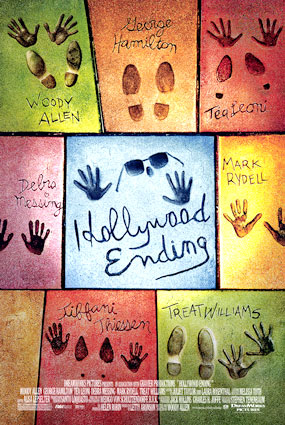Will wonders never cease...
The Golden Trailer Awards:
The Academy Awards for the short-attention-spanned?
(Already on the 5th annual show, mind you)
Trailers in 17 categories ranging from "Best Action" to "Best Romance" to "Trashiest" to "Most Original" will compete for prizes in an irreverent ceremony that recognizes a familiar, yet obscure, corner of Hollywood: movie previews. Trailers for "Eternal Sunshine of the Spotless Mind" and the Sean Penn vehicle "21 Grams" will be among those competing for the coveted Best of Show.
We live in a golden age of trailers where sophisticated artists and editors conjure exciting, beautiful previews for even the worst movies. Recall, for instance, the majestic trailer for the drab, interminable "Pearl Harbor."
It wasn't always that way. "The first credited movie trailer was from 1912, 'The Adventures of Kathlyn,' " says Ms. Brady. The crude trailer teased audiences with text title-cards. It was successful enough that four years later, Paramount began producing trailers for most of its major releases.
In the 1920s, a group of ad men formed a company called the National Screen Service to make movie trailers for the studios. For half a century, the major studios used the NSS to produce nearly every trailer made. It was a classic monopoly. "This accounts in large part for why it took the trailer industry so long to evolve," Ms. Brady explains.
As the old studio system came crashing down in the '70s, the NSS also faltered. Almost overnight the previews were being produced by independent, boutique trailer houses, all competing with one another to advance the art--and for business.
Today that business is small, but not trivial--the average cost for a trailer is $300,000. A big-budget trailer can run as much as $600,000. "Theatrical trailers alone are probably a $90 million-a-year industry," Ms. Brady says.
The dozen or so houses that make movie trailers are diverse, ranging from a shop such as Craig Murray's CM Productions (which produces big-budget trailers for movies like "Lilo & Stitch"), with over 100 people on staff, to Dan Gross's Grossmyth Co., which consists of himself, his wife and a handful of free-lancers, and caters to smaller, more adult movies (such as "Love Liza").
There is an art to cutting trailers. Typically the studio sends the editor a rough cut of the movie several months before the release date. "I watch the movie and break it down by scene," says Mr. Gross, who started his Hollywood career as a carpenter for legendary B-movie director Roger Corman, toiling on sets with future luminaries like James Cameron. "Then I write all the interesting dialogue down and come up with a script--which is either going to be narration or graphics."
The question of narration is a tricky one, thanks to Don LaFontaine, who is lovingly referred to in trailer circles as the "Voice of God." You've heard him. A veteran of 40 years and more than 4,000 trailers, his rumbling basso has enticed millions with dramatic intonations like "In a world where . . ."
So ubiquitous was Mr. LaFontaine in the '80s and '90s that today, many trailer makers try to avoid layered-on narration in order to make their product stand out. "There's less and less voiceover being used because people are tending not to respond to that hard sell," says Mr. Gross.
Mike Greenfield, whose company The Ant Farm cut the trailers for "The Lord of the Rings," came to the business after being a driver for Andrew Kuehn's Kaleidoscope Films, which helped break up the NSS monopoly in the 1970s. Mr. Greenfield is clear-eyed about the trailer-maker's responsibility: "What we do is not for the sake of the art, it's for the sake of commerce." Still, they take pride in crafting what are essentially big-budget shorts.
What makes a good trailer is a matter of taste, but among trailer experts some common themes emerge. Asked about their favorite trailers, most agree on a short list of "The Shining," "Rosemary's Baby," "Raging Bull" and "Alien." Each of those movies, of course, is a classic.
The trick is selling bad movies. "Ninety percent of all movies stink," one editor says with a laugh. "I get very annoyed with some of the expectations studios have for them. It's like, 'Did you see the same movie I saw?'" (Think, for instance, of "Mission: Impossible 2.")
"My job is to make a great and watchable trailer out of bad movies," says another editor. But this isn't a state secret. The Golden Trailers even have a separate category for such creations--the Golden Fleece Award. Last year's winner was the highly appealing trailer for the awful bikini-surfing extravaganza "Blue Crush." This year "Butterfly Effect," "Highwayman," "Leo," "Northfolk" and "Spun" have been nominated. But if any of them beats "Dumb & Dumberer," it will be considered a major upset.
To paper over the limitations of the product, editors often up the volume and intensity. "I'd like to see quieter trailers and more good movies," says indie director Miguel Arteta, who was a judge at last year's Golden Trailer Awards. "But I don't think trailers can be blamed for that."
















































